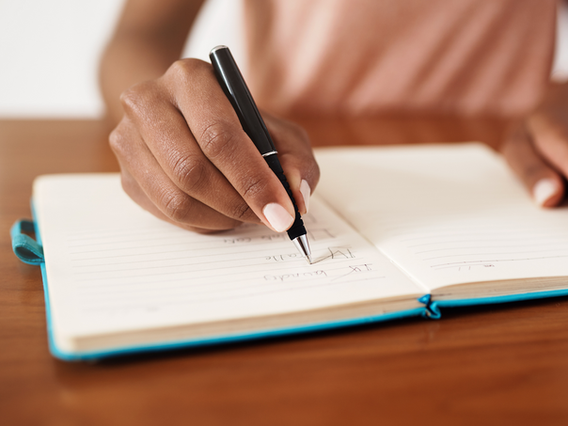Step Three: Made a decision to turn our will and lives over to the care of God as we understood God.
As we begin to let go of control, we are better able to accept the realities of being human. A good place to begin is with the Serenity Prayer. In CoDa recovery, we each learn to build a bridge to a Higher Power of our own understanding, and we allow others the same privilege.
The Serenity Prayer
God, grant me the serenity to accept the things I cannot change, courage to change the things I can, and wisdom to know the difference.
For many of us who came to find recovery from codependency, minding other people’s business had become a way of life. We might have been taught by well-meaning people that we really were responsible for the well-being of others and that our words and actions were powerful enough to change those with whom we interacted.
“In this moment I surrender. I am no longer a victim. I take responsibility for myself. I surrender, because I am making a conscious choice to do so. Surrender is not an act of weakness, but one of strength and choice. I choose to surrender to allow a new way of living to enter my life and being. My Higher Power’s wisdom is vast and encompasses so much more than I could ever individually know. I trust that through whatever comes, the result will be the greatest good for all. Surrender is the beginning of freedom.”
Made a Decision
Step Three offers us the opportunity to make a decision and to have faith in a power greater than ourselves. Many of us begin working this Step with small things, such as making a decision not to fix someone, letting our feelings just be there, or not trying to control, just for a few minutes at a time. As we experience the benefits of working Step Three, we find ourselves more willing to trust in the care of a loving Higher Power and to experience faith.
We are asked to make a decision to let go of ourselves and others. We decide whether we can trust in God to care for all we consider precious and important. Trust does not come easily for many of us. For years we have put our faith and hope in ourselves and others. We relied on everything but our Higher Power to provide us peace, happiness and well-being. Control and avoidance have demanded a great deal of our time, attention and energy. We know we’ve abandoned ourselves and given others the power of our well-being. We may have been ruled by fear, anger, resentment, guilt and a powerful urge to take care of, or be taken care of, by those we have invested with “authority” to govern our lives. Through our work with Steps One and Two we realize that control and avoidances no longer work and that others are no longer responsible for our happiness. We begin to realize how our playing God or giving the power of God to others is short-lived, painful and ultimately, self-destructive. We gain a better understanding of a power greater than ourselves. We remember that we are asked only to make a decision. We are not asked to instantly experience total faith and trust in God. Why not give God a chance where we had failed? Besides, what did we have to lose but our misery? Until we turn our emotional attention to God, we are still bound by our codependent thoughts, feelings and behaviors….
“In this moment ~ I am at peace. What a joy to be living God’s Will and not mine. When I forget how important it is to spend some quiet time each day with myself and my Higher Power, I find my life becoming unmanageable and my addictions call out to me. I love Third Step work because of the peace I experience. I remember everything is in God’s hands. I trust the outcome and I don’t have to fight the things which over which I am powerless. My codependency is a difficult thing to outgrow, but with God’s help, I am making a lot of progress. I use the Steps to get my thinking sorted out and stay on track.”
Turning Over our Will and Our lives
We may be frightened by the thought of allowing God to take care of us and the other people in our lives. What if God doesn’t do what we think best? What if things don’t go the way we would like? What if “they” don’t change? What will happen if others don’t like us as we change in recovery? As codependents, our fears are understandable. They lay beneath our intense need to control and avoid ourselves and others. In letting go of our control and avoidances, these fears often surface and we are emotionally faced with our spiritual dilemma. Once we face these fears, we are at a crossroads: Do we return to playing God in ours and others lives or do we turn our will and life over to the care of God as we understand God?
Our ability to trust in healthy ways has, more than likely, been negatively affected by the codependence in our lives. We cannot expect to turn over our Will and our Lives without some reservation and fear. Letting go can be seen as a decision to trust in a Higher Power. Letting God be seen as living in this power’s will and doing our best to take whatever actions are necessary to take care of ourselves today, without attempting to control results tomorrow. It can be frightening to trust in something we cannot see and to have faith that all is happening on schedule, especially when we may have been unable to trust our parents or other authority figures throughout our childhood years. However, most of us find this struggle to trust well worth our efforts. We can accept our fear, ask our Higher Power’s guidance, and practice faith. We seek the support and understanding of our sponsors and recovery friends.
Feeling a sense of urgency, feeling that we have to do something or feeling resentment, can all be signals that we need to let go and trust in God. Positive affirmations support us in learning new behavior. Using affirmations to replace the ‘old tapes’ in our head can open us to Higher Power’s will. Learning new behavior takes time. We can give ourselves permission to be human!
“In this moment I choose to wait. I’m working Step Three. I feel an urgent need to DO SOMETHING, but the way is not clear. I have no sense of peace. Doing nothing in these situations, choosing to wait, instead of acting in panic and urgency, is an act of faith. I wait, and turn the problem and solution over to my Higher Power. It may seem irresponsible or lazy, but I choose to see it positively and call it letting go. When the time comes, I will act. For now, I am doing nothing except “turning it over” to my Higher Power. That is doing something powerful. That is faith.
Some Empowering Affirmations
- “I release my fear of feeling my feelings”
- “I replace my fear with faith and courage. I am learning to let go and allow my Higher Power to provide direction for me”
- “I let my Higher Power lead the way, I am safe and secure”
- “I trust my Higher Power to give me all that I need”
- “I let go of destructive ways of living and learn new ways”
- “ My Higher Power accompanies me on the journey of life”
- “I will leave the heavy load to my Higher Power and feel lighter and more serene”
- “I let go of my Will. I hear and accept my Higher Power’s Will for me”
- “God is God and I am not”
As we progressively release our control and avoidance behaviors and refocus our attention and energies on our own personal recovery, we’re not as overwhelmed by life’s circumstances. We experience a growing sense of serenity and we more effectively release the lives of others to the care of God. Our trust grows stronger by continuing our recovery work and experiencing how God helps us to change our codependent behavior. We feel a healthier sense of well-being. Our tendency to control and avoid others and ourselves decreases.
- We can allow ourselves to be cradled in care and in faith.
- We can learn to be in the present moment and live God’s Will for us.
- We can let go of trying to control and making things okay for others and ourselves in ways that no longer work.
- We can find courage in a Higher Power and the ability to be who and what we are.
At times, we may experience circumstances when we think God cannot or will not help. We may revert to our former codependent survival patterns. Our old ideas call out to us to return to self will. If we look closely, we find that fear, shame or fear of shame are at work once again. This experience leads us to acknowledge that this program of recovery is not a “flash in the pan” , something nice to do on a pleasant afternoon. It represents our opportunity to live as whole human beings. And, if we wanted it, we would need the willingness to go to any lengths – even if it meant asking God for help more than once.
Day by day we strengthen our relationship with God. We become more responsible for our recovery by placing this relationship first. Constant vigilance in our program appears to be essential for codependents. As such, many of us find great freedom in the daily action, practice and renewal of Step Three.
“TO THE CARE OF GOD” – Step Three
In this moment, my Higher Power cares for me. This means that my Higher Power really cares about me. I’m turning my life and my will over to one who cares for me more than I cared for myself.
Believing that my Higher Power protects and directs me was a giant leap of faith. Once I made the leap and became willing, My Higher Power started working in my life. I experience unconditional love. Little miracles appear in my life. I feel loved, special and worthwhile.
Questions to Consider for Reflection
How do I know when I need to let go?
How do I let go?
How can I be in touch with my Higher Power’s will for me?
In what ways does my Higher Power speak to me?
If I weren’t allowing a particular circumstance to control me, or if I weren’t trying to control that circumstance – if I just let it be and accepted it as okay for the present moment – how would I feel? If I wasn’t fighting with or resisting the circumstance, what would I be doing? How would I be feeling?
If I cannot trust myself, how can I trust my Higher Power. How do I practice trusting?
Am I ready to let go and let God have a hand in managing my life?



